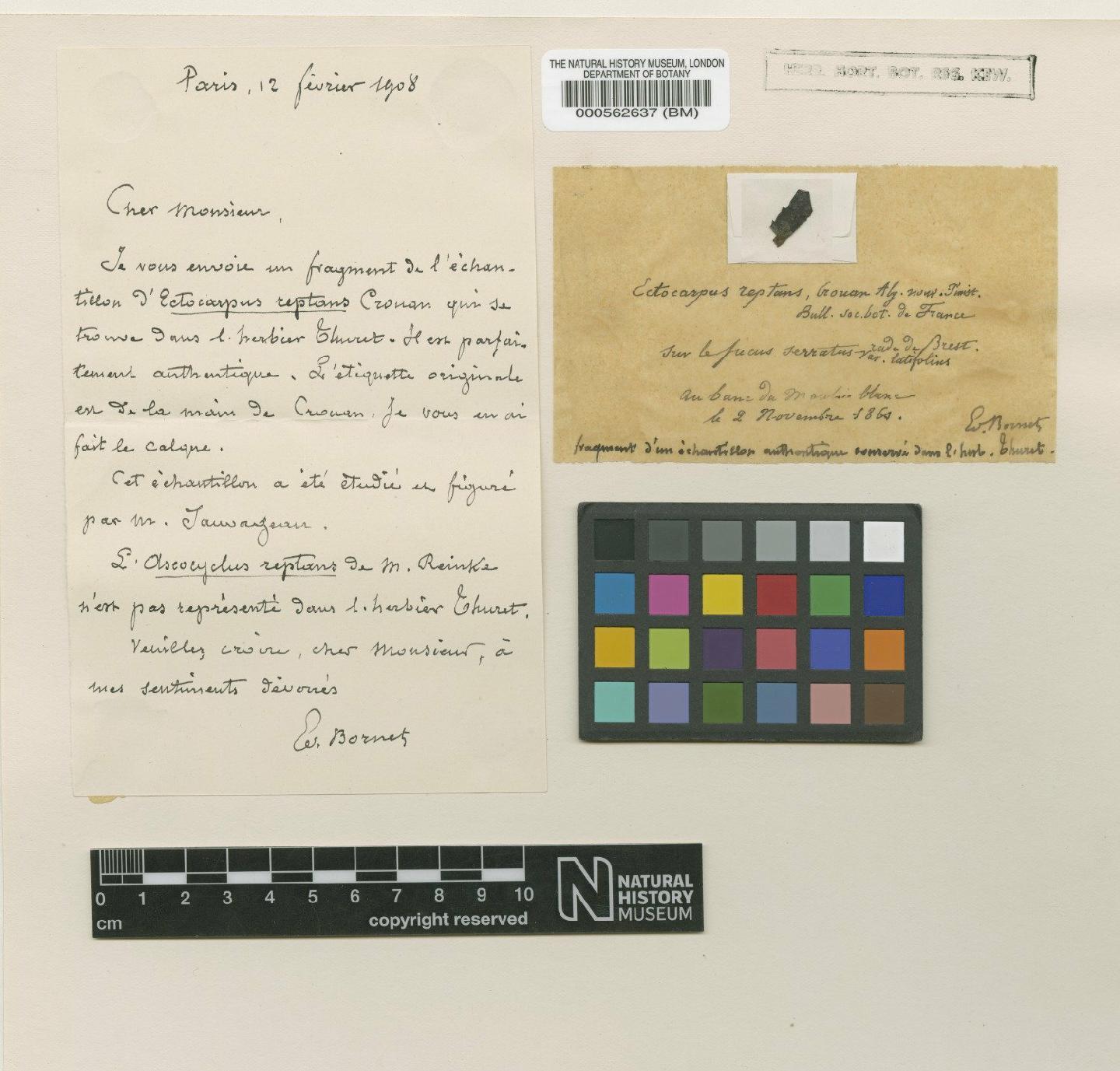WoRMS name details
Chilionema reptans (P.L.Crouan & H.M.Crouan) Sauvageau, 1897
145338 (urn:lsid:marinespecies.org:taxname:145338)
unaccepted
Species
marine
Not documented
Distribution Long Island Sound, Bay of Fundy to Scotian coast, Gulf of St. Lawrence to Strait of Belle Isle
Distribution Long Island Sound, Bay of Fundy to Scotian coast, Gulf of St. Lawrence to Strait of Belle Isle [details]
Guiry, M.D. & Guiry, G.M. (2024). AlgaeBase. World-wide electronic publication, National University of Ireland, Galway (taxonomic information republished from AlgaeBase with permission of M.D. Guiry). Chilionema reptans (P.L.Crouan & H.M.Crouan) Sauvageau, 1897. Accessed through: World Register of Marine Species at: https://www.marinespecies.org/aphia.php?p=taxdetails&id=145338 on 2024-11-21
Date
action
by
Copyright notice: the information originating from AlgaeBase may not be downloaded or replicated by any means, without the written permission of the copyright owner (generally AlgaeBase). Fair usage of data in scientific publications is permitted.
basis of record
Guiry, M.D. (2001). Macroalgae of Rhodophycota, Phaeophycota, Chlorophycota, and two genera of Xanthophycota, <B><I>in</I></B>: Costello, M.J. <i>et al.</i> (Ed.) (2001). <i>European register of marine species: a check-list of the marine species in Europe and a bibliography of guides to their identification. Collection Patrimoines Naturels,</i> 50: pp. 20-38 (look up in IMIS) [details]
basis of record Guiry, M.D. & Guiry, G.M. (2024). AlgaeBase. <em>World-wide electronic publication, National University of Ireland, Galway.</em> searched on YYYY-MM-DD., available online at http://www.algaebase.org [details]
additional source Integrated Taxonomic Information System (ITIS). , available online at http://www.itis.gov [details]
additional source Sears, J.R. (ed.). 1998. NEAS keys to the benthic marine algae of the northeastern coast of North America from Long Island Sound to the Strait of Belle Isle. Northeast Algal Society. 163 p. [details]
additional source South, G. R.;Tittley, I. (1986). A checklist and distributional index of the benthic marine algae of the North Atlantic Ocean. <em>untsman Marine Laboratory. St. Andrews, New Brunswick.</em> 1-76. [details]
additional source Muller, Y. (2004). Faune et flore du littoral du Nord, du Pas-de-Calais et de la Belgique: inventaire. [Coastal fauna and flora of the Nord, Pas-de-Calais and Belgium: inventory]. <em>Commission Régionale de Biologie Région Nord Pas-de-Calais: France.</em> 307 pp., available online at http://www.vliz.be/imisdocs/publications/145561.pdf [details]
source of synonymy Guiry, M.D. & Guiry, G.M. (2024). AlgaeBase. <em>World-wide electronic publication, National University of Ireland, Galway.</em> searched on YYYY-MM-DD., available online at http://www.algaebase.org [details]
basis of record Guiry, M.D. & Guiry, G.M. (2024). AlgaeBase. <em>World-wide electronic publication, National University of Ireland, Galway.</em> searched on YYYY-MM-DD., available online at http://www.algaebase.org [details]
additional source Integrated Taxonomic Information System (ITIS). , available online at http://www.itis.gov [details]
additional source Sears, J.R. (ed.). 1998. NEAS keys to the benthic marine algae of the northeastern coast of North America from Long Island Sound to the Strait of Belle Isle. Northeast Algal Society. 163 p. [details]
additional source South, G. R.;Tittley, I. (1986). A checklist and distributional index of the benthic marine algae of the North Atlantic Ocean. <em>untsman Marine Laboratory. St. Andrews, New Brunswick.</em> 1-76. [details]
additional source Muller, Y. (2004). Faune et flore du littoral du Nord, du Pas-de-Calais et de la Belgique: inventaire. [Coastal fauna and flora of the Nord, Pas-de-Calais and Belgium: inventory]. <em>Commission Régionale de Biologie Région Nord Pas-de-Calais: France.</em> 307 pp., available online at http://www.vliz.be/imisdocs/publications/145561.pdf [details]
source of synonymy Guiry, M.D. & Guiry, G.M. (2024). AlgaeBase. <em>World-wide electronic publication, National University of Ireland, Galway.</em> searched on YYYY-MM-DD., available online at http://www.algaebase.org [details]
 Present
Present  Present in aphia/obis/gbif/idigbio
Present in aphia/obis/gbif/idigbio  Inaccurate
Inaccurate  Introduced: alien
Introduced: alien  Containing type locality
Containing type locality
Unreviewed
Diet photosynthetic [details]Distribution Long Island Sound, Bay of Fundy to Scotian coast, Gulf of St. Lawrence to Strait of Belle Isle [details]
Habitat epiphyte on Fucus and other algae [details]
Morphology Brown colour results from the dominance of the xanthophyll fucoxanthin; this masks the other pigments, Chlorophyll a and c (no chlorophyll b), beta-carotene and other xanthophylls. [details]
Remark Species was mentioned in original list, but not in the final publication: Costello, M.J.; Emblow, C.; White, R. (Ed.). (2001). European register of marine species: a check-list of the marine species in Europe and a bibliography of guides to their identification. Collection Patrimoines Naturels, 50. Muséum national d'Histoire Naturelle: Paris, France. ISBN 2-85653-538-0. 463 pp. [details]
Reproduction general for group: most brown algae have an alternation of haploid and dioploid generations; The haploid thalli form isogamous, anisogamous or oogamous gametes and the diploid thalli form zoospores by meiosis. [details]

